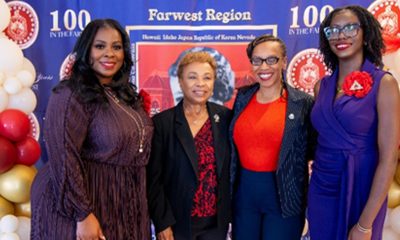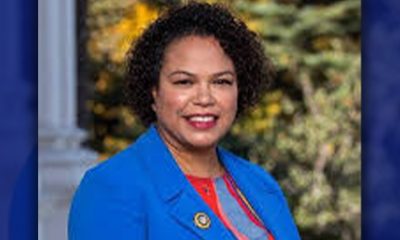Black Voice News
California Looks to Lead Nation in Unraveling Childhood Trauma
BLACK VOICE NEWS — Imagine identifying a toxin so potent it could rewire a child’s brain and erode his immune system. A substance that, in high doses, tripled the risk of heart disease and lung cancer and reduced life expectancy by 20 years. And then realizing that tens of millions of American children had been exposed.
By Anna Maria Barry-Jester
Imagine identifying a toxin so potent it could rewire a child’s brain and erode his immune system. A substance that, in high doses, tripled the risk of heart disease and lung cancer and reduced life expectancy by 20 years.
And then realizing that tens of millions of American children had been exposed.
Dr. Nadine Burke Harris, California’s newly appointed surgeon general, will tell you this is not a hypothetical scenario. She is a leading voice in a movement trying to transform our understanding of how the traumatic experiences that affect so many American children can trigger serious physical and mental illness.
The movement draws on decades of research that has found that children who endure sustained stresses in their day-to-day lives — think sexual abuse, emotional neglect, a mother’s mental illness, a father’s alcoholism — undergo biochemical changes to their brains and bodies that can dramatically increase their risk of developing serious health problems, including heart disease, lung cancer, asthma and depression.
“ has probably single-handedly done more to elevate this issue than anyone else,” said Dr. Mona Hanna-Attisha, the pediatrician known for documenting the rise in children’s blood lead levels in Flint, Mich., after the city switched its water supply.
With Burke Harris’ selection as the state’s first surgeon general, California is poised to become a vanguard for the nation in embracing the research that traces adverse childhood experiences, or ACEs, to the later onset of physical and mental illness. In pockets across the country, it’s increasingly common for schools and correctional systems to train staff on how academic and behavioral problems can be rooted in childhood trauma. Burke Harris envisions a statewide approach whereby screening for traumatic stress is as routine for pediatricians as screening for hearing or vision, and children with high ACEs scores have access to services that can build resilience and help their young bodies reset and thrive.
As California’s surgeon general, she will have a powerful bully pulpit — and the firm backing of a new administration with deep pockets. In his first weeks in office, newly elected Gov. Gavin Newsom has made clear he intends to devote significant resources to early childhood development. He has named several recognized experts in child welfare, along with Burke Harris, to top posts, and is promoting child-centric policies that include extended family leave for new parents, home nursing visits for new families and universal preschool. In his first state budget proposal, released last month, Newsom called out ACEs by name and committed $105 million to boost trauma and developmental screenings for children.
“It should be no surprise to anyone that I’m going to be focusing on ACEs and toxic stress,” Burke Harris said in a phone interview just days into the new job. “I think my selection is a reflection of where that issue fits in the administration’s priorities.”
A Game-Changing Study
Adversity is the sort of thing we intuitively understand, at least to some extent. Having a parent who struggles with addiction or mental illness is hard on kids, as is growing up in a neighborhood marked by poverty, gun violence or drug abuse.
A 1990s study laid the groundwork, however, for an understanding of adversity that suggests it poses a pervasive threat to public health.
During interviews with patients at a Kaiser Permanente obesity clinic in Southern California, Dr. Vince Felitti was shocked at how many said they had been sexually abused as children. He wondered if the experiences could be connected. (Kaiser Health News, which produces California Healthline, is not affiliated with Kaiser Permanente.)
As head of the Department of Preventive Medicine at Kaiser Permanente in San Diego, he had access to a huge pool of patients to try to find out. Together with the Centers for Disease Control and Prevention, he surveyed more than 17,000 adult patients about 10 areas of childhood adversity. Among them: Did a parent or other adult in your household physically abuse you? Emotionally abuse you? Sexually abuse you? Go to prison? Was your mother regularly hit? Did you often go hungry? Were your parents divorced? The researchers scored each patient, assigning a point for each yes, and matched up the responses with patients’ medical records.
What they found was striking. Almost two-thirds of participants reported experiencing at least one kind of adversity, and 13 percent — about 1 in 8 — said they had experienced four or more. Those who reported experiencing high doses of trauma as children were far more likely to have serious health problems as adults, including heart disease, stroke, cancer and diabetes. And the higher their ACEs score, the worse their health was likely to be.
This extended to mental health, as well: Adults who reported experiencing four or more ACEs were 4.6 times as likely to have clinical depression and 12 times as likely to have attempted suicide.
In the 20 years since, scientists have built on the research, replicating the findings and digging into the “why.” In the simplest terms, traumatic events trigger surges in cortisol, the “stress” hormone. When those surges go unchecked for sustained periods, they can disrupt a child’s brain development, damage the cardiovascular system and cause chronic inflammation that messes with the body’s immune system.
And where children really get into trouble is when they also are missing the best-known antidote to adversity: a nurturing and trustworthy caregiver. Without that positive stimulation, children can end up with an overdeveloped threat response and a diminished ability to control impulses or make good decisions. Children with high ACEs scores are more likely to develop attention deficit hyperactivity disorder, known as ADHD, and cognitive impairments that can make school a struggle. They are more likely to grow into adults who drink to excess, are violent or are victims of violence.
The research is compelling, because it has the potential to explain so many intractable health problems. What if some portion of Generation ADHD really has PTSD? What if obesity and hypertension are disorders with roots in childhood experiences, and not just what we eat for dinner?
‘What Happens To You Matters’
Until now, Burke Harris’ professional epicenter has been Bayview-Hunters Point in San Francisco. It’s a vibrant community with a history of activism, but also deeply impoverished, and blighted by pollution and violence. It was there that Burke Harris, at her pediatric clinic, noticed that many of her young patients with serious medical conditions also had experienced profound trauma. And patients who had experienced serious adversity were 32 times more likely to be diagnosed with learning and behavioral problems than kids who had not.
When a colleague introduced her to the ACEs study, she saw her patients written between its lines. Though these problems might be concentrated in Bayview, they certainly weren’t confined there. This was a health crisis transcending race, class and ZIP code.
In the years since, Burke Harris has worked to advance ACEs science though her work at the clinic and her nonprofit research institute, the Center for Youth Wellness. She regularly travels the country to train fellow pediatricians in trauma screening and treatment. She has written an acclaimed book on the issue, “The Deepest Well,” and her TED talk on the topic has been viewed nearly 5 million times online.
Now, she’ll be directing her singular focus back on California.
She plans to start with a statewide tour to hear from doctors and other health leaders about barriers to increasing pediatric screening and care. She’ll also be talking about the science of ACEs. “It’s Public Health 101 that raising awareness is a critical form of primary prevention,” she said.
But even with the funding included in Newsom’s budget, there are challenges to standardizing trauma screening. For one: In medicine, it’s common practice that you screen only for what you can treat. Many doctors — even those persuaded by research on adversity — have raised concerns about the lack of established protocols for treating childhood trauma. What can a pediatrician, with her 15-minute time slots and extensive to-do list, do about the ills of an absent parent, or a neighborhood riddled with gun violence?
In general, experts working on the issue say a critical ingredient in helping kids heal is ensuring they find and develop healthy relationships.
“All of us want to feel seen, heard, understood and supported,” said Alicia Lieberman, a researcher at the University of California-San Francisco who specializes in early childhood trauma. Involving parents is an essential aspect of treatment, particularly because so many have experienced trauma themselves. “It has to start with an acknowledgment that what happens to you matters.”
Researchers have found early success in seemingly simple interventions: Therapists coaching parents by filming and playing back positive interactions with their child. Therapists working with teachers on how to support their students. Key to success, said Pat Levitt, chief scientific officer at Children’s Hospital Los Angeles, are quality programs that start early and recognize the role of relationships.
At her clinic, Burke Harris coordinates with a team that wraps a child in care, treating mind and body. When a patient scores high on the adversity scale, she can send them down the hall to a therapist; connect them with classes on meditation, nutrition and exercise; involve the family in counseling; and aggressively monitor for and treat any physical manifestations.
Most clinics aren’t set up for this staff-intensive approach.
Dr. Andria Ruth, a pediatrician with the Santa Barbara Neighborhood Clinics in California, is among those researching how to “treat” adversity within a more traditional doctor’s office. Her research team is randomly assigning patients who screen positive for trauma into one of three groups. One group is assigned a navigator who connects the family to services for basic needs, such as food and housing. A second group also sees a behavioral health therapist at their child wellness visits. The third group receives both those services, and gets home family visits from therapists.
Ruth has a healthy skepticism about what’s possible, but she and her colleagues are convinced childhood trauma does pose a potent health threat: None of them felt comfortable including a control group that wouldn’t receive any services.
In the big picture, these experts say, addressing the fallout of traumatic stress will require a broader paradigm shift, to a system that recognizes that bad behavior can be a physical symptom rather than a moral failing. Gov. Newsom has signaled a move in that direction: In January, he said he would transfer the Division of Juvenile Justice out of the Department of Corrections, which runs the state’s prison system, and into the Health and Human Services Agency.
Garnering that kind of official backing is a powerful boost, said Jason Gortney, director of innovation at the Children’s Home Society of Washington, that state’s oldest and largest nonprofit dedicated to child welfare. His organization has lots of programs with promising results, he said, but connecting them to state agencies that aren’t used to working together is a challenge.
With Burke Harris crusading from the surgeon general post, Gortney said, he and fellow advocates across the country are hoping California can provide a beacon.
“Maybe California can show some of the other states how to do this,” he said.
This story was produced by Kaiser Health News, which publishes California Healthline, an editorially independent service of the California Health Care. Black Voice News is a distribution partner of Kaiser Health News.
This article originally appeared in Black Voice News.
African American News & Issues
Geoffrey’s Inner Circle Not included in Funding Support
We will ultimately be successful in our efforts to reach the goal of our fundraising campaign but will also ensure that the native Oakland community of African Americans will receive equal assistance and opportunity in this city.

Publisher’s note by Paul Cobb: Several years ago when writer MarvinX Jackmon and I asked Mayor Libby Schaaf and Councilmember Lynette Gibson McElhaney to name the downtown business district in honor of the historic Black achievements, Black Newspaper, Black Businesses, Art Galleries, Black Museum, Government Buildings, Arts and Entertainment venues, I asked the Mayor to make sure that Geoffrey’s Inner Circle would receive the same financial support and grants that the Fox Theatre and the Oakland Auditorium were receiving. I reminded her how I as the former director of OCCUR, had led a group of historical preservationists to save the Fox from a demolition wrecking ball, she said she liked the Malonga Arts Complex instead. We at the Oakland Post support Geoffrey’s Go Fund Me appeal https://gofund.me/b2541419 with a $1,000.00 donation and my wife Gay Plair Cobb and I urge others to join us either in-kind or with at least the donation of a “Tubman” ($20.00 bill). Geoffrey’s ironically was the original home of Oakland’s white power structure. (We have published a photo below of how those White wealthy leaders often met and entertained themselves by adorning themselves in Black Face at the former Athenian Nile Club ( now Geoffrey’s). And now that the same establishment is represented by the face of a Black man, his establishment is being whitewashed with neglect.
The Post has asked Mr. Pete to give his own opinion below.
Paul Mooney appeared at Geoffrey’s Inner Circle some 30 or more times over the years. His platform and message were always used to shed a light on the grave racial disparity and economic injustice that has, whether acknowledged or not, plagued this country since its inception. This racially aggressive ideology has also had its tangles in our dear city of Oakland. A disparity study illustrated by Dr. Eleanor Ramsey highlighted the glaring absence of African Americans in the city’s landscape of budgeted allotments for professional services, labor construction and city development.
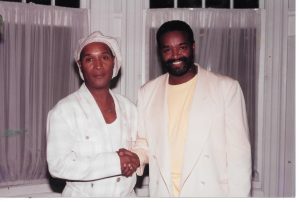
Former entertainer Paul Mooney often performed at Geoffrey’s urging America to face-up to White racism
While I applaud Yoshi’s Oakland for reaching their goal in their most recent Go Fund Me efforts, it should be noted that Yoshi’s also received $5 million dollars in assistance from both the City and Port of Oakland to open a jazz entertainment venue at Jack London Square. Geoffrey’s Inner Circle, a live entertainment venue that began at Jack London Square, has been operating for 30 years. This offer was not extended to expand GIC or renovate, nor was it offered to any other Black Owned Business in the entertainment genre in Oakland.
The Fox Oakland was $50 million dollars over budget for its renovation project and most recently left the City of Oakland with a $78 million cost overrun.
When an African American Development Firm entered a bid on the Oakland Auditorium/ Kaiser Center, the city gave a white developer the contract and $12 million dollars in naming rights. This deal in its origin should not have had any monetary exchange whatsoever, naming rights included. The aforementioned developer has additionally secured a 99-year lease that will cost him a hefty $1 dollar. He will also receive tax credits to the tune of a $20-$40-million-dollars in subsidies. Go fund me has a different ring to it if you are non-black and vending with the City of Oakland it seems.
We will ultimately be successful in our efforts to reach the goal of our fundraising campaign but will also ensure that the native Oakland community of African Americans will receive equal assistance and opportunity in this city.
Thank you in advance for your support!
Geoffrey Pete
GoFundMe
Bay Area
Holy Names University Celebrates New Teachers Completing Credentials
“I know very deeply what it means to be a teacher at any time but especially this past year. We wanted to do something special, and maybe this is starting a trend, to acknowledge all of our credential program completers.”

Holy Names University’s School of Education held a Zoom celebration at the end of the school year on May 28 to recognize eight new teachers who completed their teaching credentials, successfully finishing their rigorous training in the midst of an extremely challenging pandemic year.
The credential completers were honored by Dr. Kimberly Mayfield, dean of the School of Education, who emphasized the humanistic and nurturing approach to teaching that is the hallmark of Holy Names.
Reflecting on the principles that motivate the HNU staff, she said, “We train our candidates to be effective no matter what the setting is. Although this (year’s conditions) were unique, our candidates were expertly prepared for it.”
“I know very deeply what it means to be a teacher at any time but especially this past year. We wanted to do something special, and maybe this is starting a trend, to acknowledge all of our credential program completers.”
Mayfield explained that education and Oakland schools are a profound part of who she is. She is herself a former Oakland teacher; her mother was an Oakland teacher for many years; and her husband is currently an Oakland teacher.
“My hope and my charge for our candidates is not only to deliver the kind of education you’ve been trained to do but to really be sure that your classrooms are safe places for all students at your school,” Mayfield continued.
“When there are students who seem to be outliers and maybe don’t fit the picture of the school at large, that student fits the picture of success for you as a HNU graduate. Your classrooms become the safe places for all students, not just the students that are in your class or on your (rolls). That is the ethic of care that we’ve imparted.
“We are coming together in love and we want to recognize the good work that our HNU candidates have done.
She said that the Holy Names teachers are exceptional people. “When we do recruitment events, we always say we aren’t just training teachers to be teachers, we’re training teachers to be effective with our own children. When we look at who we want in the program, we are looking for candidates through those eyes. It’s a higher standard. Our relationship with you is forever.”
The eight Holy Names credential completers are:
- Todd Brewer, who is completing a special education credential. He teaches 8th grade at Impact Academy;
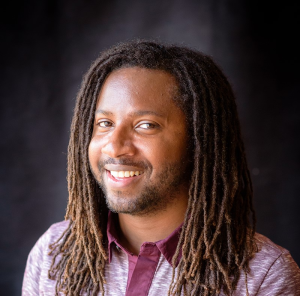
Todd Brewer
- Mason Brown, who is completing his single subject in science. He teaches physics for 10th, 11th and 12th graders at East Bay Innovation Academy;
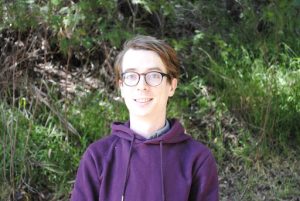
Mason Brown
- Angela Calderon, who is completing her special education credential. She has been teaching special education at Richmond High School;

Angela Calderon
- Jaron Epstein, who is completing a special education credential. He has been teaching 6th-8th grade in a special day class at West Oakland Middle School;

Jaron Epstein
- Alexander Niuatoa, who is earning a single subject physical education credential. He teaches 7th and 8th graders at Winton Middle School and 10th grade at Hayward High School.
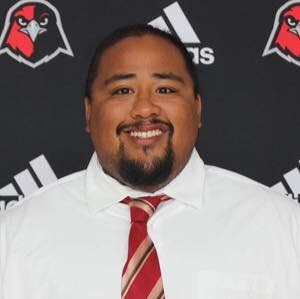
Alexander Niuatoa
- Erica Nurse, who is receiving her multiple subjects credential. She has been teaching second grade at Tolenas Elementary School in Fairfield and gives private music instruction in Vallejo.

Erica Nurse
- Shazmine Randle, who is earning a special education credential. She teaches 6th through 8th graders at Creekside Middle School.

Shazmine Randle
- Mariya Snazina is earning a world languages credential. She teaches French at Castro Valley High School.

Mariya Snazina
Each of the credential completers who attended the celebration will receive a $200 gift card, courtesy of a donation by the Teel Family Foundation, to help them buy supplies for their classrooms for the new school year.
Mayfield ended the ceremony by remembering the legacy of “really great educators who have gone before you: Dr. Fred Ellis, Margie Mayfield and Sylvester Hodges.”
“I want you to know that their energy is with you and supporting you as you go out and do really great work,” she said.
Black Voice News
BOE Member Malia Cohen Raises Red Flag on Bank-Breaking Prop 19 Tax Costs
“The challenge is that it was voted upon and the election has been certified. So, it’s the law,” Cohen said during a virtual media news briefing with reporters from across the state on January 29 organized by California Black Media.

Malia M. Cohen, the only African American member of the California Board of Equalization (BOE), has some critical concerns about the cost homeowners will have to bear because of Proposition 19, a constitutional amendment that took effect on Dec. 16, 2020.
Cohen, who represents 10 million Californians in 23 counties on the board, is concerned with how Prop. 19 will affect Black and other minority homeowners across California. The BOE is the commission responsible for implementing the law.
“The challenge is that it was voted upon and the election has been certified. So, it’s the law,” Cohen said during a virtual media news briefing with reporters from across the state on January 29 organized by California Black Media.
In her commentary, Cohen discussed the ways the law will impact all property owners.
“It not only affects our respective Black communities,” she told the reporters. “It affects all homeowners and property owners in the state of California. When people wake up there is going to be a massive coalition (to fight it) — possibly an uprising. People need to know what the real deal is.”
Cohen said she is planning other events similar to the news briefing she had with CBM. There, residents of California will begin to hear about “the first steps” they can take to become educated about how Prop.19 will hit their bottom lines. This is something she feels was not adequately explained to voters when the referendum was placed on the ballot last November.
On Nov. 3, 2020, California voters approved Prop. 19, the “Home Protection for Seniors, Severely Disabled, Families, and Victims of Wildfire or Natural Disasters Act.”
Although Prop. 19 was enacted in December, Cohen warns that a critical part of the legislation will take effect on February 16. Until that date, the state currently allows tax breaks for parent-child transfers. When parents give or sell real property to their children (or perhaps, grandchildren), that heir continues to pay property taxes at the same rate assessed on the home value as the parent.
After February 16, Prop. 19 will eradicate the parent-child exclusion. Then, parents would still be able to transfer their house to a child, and the child may keep the parent’s assessed value. But the Prop. 19 law has added one critical condition: the child must move into the residence and make the property his or her own primary residence. If not, the property will be reassessed at what the current tax cost is for the home at that time.
Cohen discussed the immediate property tax implications and how it might impede property owners’ intentions to create generational wealth by transferring their personal residence and other property they own to their children as part of their estate planning.
BOE Tax Counsel Richard Moon also participated in the briefing.
“What is required is that a child moving into the home must file a homeowner exemption and that needs to be done within a year of the transfer date,” Moon said. “The child has one year to move into the family home and maintain that family home in order to keep the exclusion. But if they move out after three years, the property would be assessed at that point.”
Rates of Black homeownership in California and across the country are still far below that of Whites and other minorities. Critics of the law say the fact that Prop. 19 could set up even more barriers to African Americans owning homes – and straddle struggling families with additional financial burdens – is problematic. About 2.2 million Black people reside in California, around 5.5% of the state’s population. According to the U.S. Census Bureau, the rate of white American homeownership is over 73%, while that of African Americans stands at 41%, Black Enterprise magazine reported in 2019.
According to data compiled by Lending Tree, the country’s leading online home loan marketplace, Los Angeles is one of the cities with the highest percentage of Black homeowners. Utah’s Salt Lake City, Texas’ San Antonio, Oregon’s Portland, and Northern California’s San Jose are also included on that list.
African Americans primarily generate wealth through homeownership and home inheritances, according to data included in the Urban Institute’s “2019 Black Homeownership Gap: Research Trends and Why Growing Gap Matters” report.
“Homeownership is currently the largest single source of wealth-building” among the Black population, the study stated. Between 2005 and 2008, over 240,000 African Americans lost their homes to foreclosure according to the Center for Responsible Lending.
“The financial crisis triggered a massive destruction of wealth for African Americans,” Alanna McCargo, co-director of the Urban Institute’s Housing Finance Policy Center told the Washington Post in 2019. “Wealth is inextricably linked to housing, and that wealth gap is evident in figures for Black-owned property in this country.”
The law, as it is written, would exclude from the term “purchase” and the phrase “change in ownership” for purposes of determining the “full cash value” of property in the purchase or transfer of a family home or family farm, for example.
Hardy Brown, Publisher Emeritus of the Black Voice News in Riverside says some of the spirit of Prop. 19 may have been positive. The state intended to provide financial cover for the mostly white Californians living in fire- and flood-prone parts of the state in the event disaster happens. But what it ends up doing, he argues, is decimate the wealth of Blacks and other minorities.
“It doesn’t help,” said Brown. “It might make a quick buck for campaign contributors or help the state to be a good neighbor to some people, but severely harms others in the process. What it really ends up doing is putting another law on the necks of Black people in the state of California. It will choke the breath right out of us.”
Under its constitutional mandate, the BOE oversees the assessment practices of the state’s 58 county assessors, who are charged with establishing values for approximately 13.6 million properties each year.
“We are not talking about $25 million palaces in Malibu. We are talking about humble homes. Middle-class homes,” Cohen said. “I live in the Bay View community (of San Francisco). We’re talking about Baldwin Hills of Los Angeles or Encanto in San Diego and other communities throughout California. Homes that were purchased for $100,000 decades ago that now have a market value of over $1 million. These homes were paid for through hard work and could be potentially lost.”
-

 Activism3 weeks ago
Activism3 weeks agoOakland Post: Week of November 12 – 18, 2025
-

 Activism2 weeks ago
Activism2 weeks agoIN MEMORIAM: William ‘Bill’ Patterson, 94
-

 Activism3 weeks ago
Activism3 weeks agoHow Charles R. Drew University Navigated More Than $20 Million in Fed Cuts – Still Prioritizing Students and Community Health
-

 Bay Area3 weeks ago
Bay Area3 weeks agoNo Justice in the Justice System
-

 #NNPA BlackPress3 weeks ago
#NNPA BlackPress3 weeks agoThe Perfumed Hand of Hypocrisy: Trump Hosted Former Terror Suspect While America Condemns a Muslim Mayor
-

 #NNPA BlackPress2 weeks ago
#NNPA BlackPress2 weeks agoTrump’s Death Threat Rhetoric Sends Nation into Crisis
-

 #NNPA BlackPress4 weeks ago
#NNPA BlackPress4 weeks agoProtecting Pedophiles: The GOP’s Warped Crusade Against Its Own Lies
-

 #NNPA BlackPress3 weeks ago
#NNPA BlackPress3 weeks agoIn Major Win for Rep. Al Green, Texas Maps Blocked by Federal Judge









